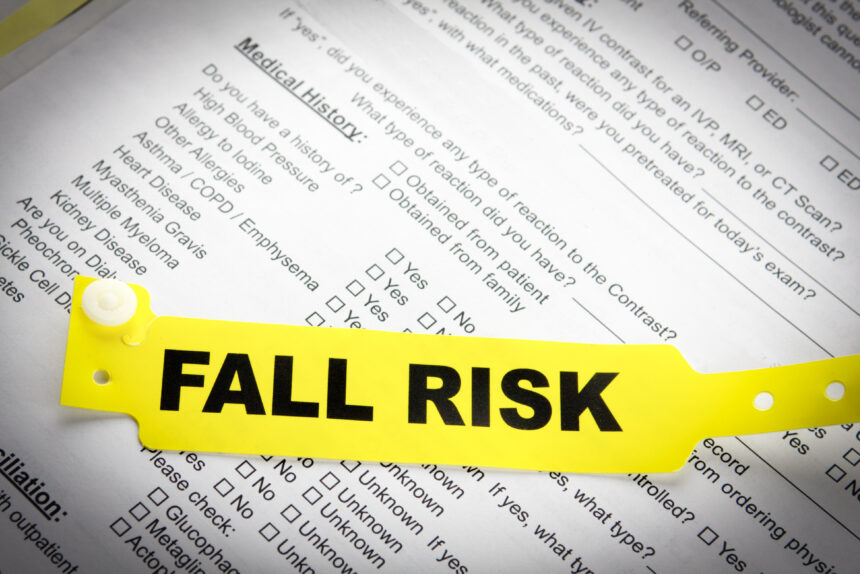The smart Trick of Dementia Fall Risk That Nobody is Talking About
The smart Trick of Dementia Fall Risk That Nobody is Talking About
Blog Article
Not known Facts About Dementia Fall Risk
Table of Contents3 Easy Facts About Dementia Fall Risk ShownDementia Fall Risk - An OverviewHow Dementia Fall Risk can Save You Time, Stress, and Money.More About Dementia Fall RiskThe Buzz on Dementia Fall Risk
Assessing fall danger helps the whole healthcare group develop a much safer setting for every person. Make certain that there is a marked area in your medical charting system where team can document/reference scores and document appropriate notes associated with fall prevention. The Johns Hopkins Fall Danger Analysis Tool is among several devices your team can make use of to aid protect against negative medical occasions.Client falls in health centers are common and devastating negative occasions that continue in spite of decades of effort to minimize them. Improving interaction throughout the analyzing registered nurse, treatment group, client, and patient's most involved loved ones might reinforce loss prevention initiatives. A group at Brigham and Women's Medical facility in Boston, Massachusetts, looked for to establish a standardized autumn avoidance program that centered around enhanced interaction and client and family engagement.

The innovation group highlighted that effective application depends on client and personnel buy-in, integration of the program right into existing workflows, and integrity to program processes. The team kept in mind that they are facing exactly how to guarantee connection in program application during durations of dilemma. Throughout the COVID-19 pandemic, as an example, a rise in inpatient drops was connected with limitations in client involvement in addition to restrictions on visitation.
4 Easy Facts About Dementia Fall Risk Explained
These cases are commonly thought about preventable. To apply the intervention, companies need the following: Access to Loss ideas resources Fall pointers training and retraining for nursing and non-nursing personnel, including new nurses Nursing operations that allow for individual and family interaction to conduct the falls analysis, make sure usage of the avoidance strategy, and carry out patient-level audits.
The outcomes can be extremely damaging, frequently increasing client decline and creating longer healthcare facility remains. One research study estimated keeps boosted an added 12 in-patient days after a client fall. The Loss TIPS Program is based on interesting people and their family/loved ones throughout three major procedures: evaluation, personalized preventative interventions, and bookkeeping to make sure that people are participated in the three-step fall prevention procedure.
The individual evaluation is based upon the Morse Fall Range, which is a verified fall threat assessment tool for in-patient healthcare facility setups. The scale consists of the 6 most usual reasons people in medical facilities fall: the client autumn background, high-risk conditions (consisting of polypharmacy), usage of IVs and other outside tools, psychological condition, gait, and mobility.
Each threat variable links with one or see page even more workable evidence-based treatments. blog The registered nurse creates a strategy that includes the interventions and shows up to the treatment group, person, and family members on a laminated poster or printed aesthetic aid. Nurses establish the plan while meeting the individual and the person's household.
The Only Guide for Dementia Fall Risk
The poster serves as a communication tool with various other members of the person's treatment group. Dementia Fall Risk. The audit part of the program includes assessing the individual's understanding of their threat elements and prevention plan at the device and healthcare facility levels. Nurse champions perform at the very least 5 private interviews a month with clients and their family members to check for understanding of the loss prevention plan
.png)
A projected 30% of these drops result in injuries, which can range in severity. Unlike various other damaging events that need a standard clinical reaction, fall prevention depends highly on the requirements of the individual.
Dementia Fall Risk Things To Know Before You Buy

Based upon bookkeeping outcomes, one site had 86% conformity and two sites had more than 95% conformity. A cost-benefit analysis of the Loss pointers program in eight healthcare facilities approximated that the program price $0.88 per patient to carry out and led to cost savings of $8,500 per 1000 patient-days in direct prices connected a knockout post to the prevention of 567 falls over three years and 8 months.
According to the innovation team, companies thinking about carrying out the program should conduct a readiness assessment and drops avoidance voids evaluation. 8 Furthermore, organizations must ensure the essential facilities and workflows for application and establish an implementation plan. If one exists, the organization's Autumn Prevention Task Force must be involved in planning.
Dementia Fall Risk Fundamentals Explained
To begin, companies should guarantee conclusion of training components by nurses and nursing assistants - Dementia Fall Risk. Medical facility staff should analyze, based on the demands of a health center, whether to use a digital health record printout or paper version of the fall prevention strategy. Implementing teams should recruit and educate nurse champions and develop processes for bookkeeping and reporting on autumn data
Staff need to be included in the process of revamping the process to engage people and family members in the analysis and prevention plan process. Solution must remain in area to ensure that units can recognize why an autumn took place and remediate the reason. Extra specifically, registered nurses need to have networks to supply continuous comments to both personnel and unit management so they can adjust and improve autumn avoidance operations and connect systemic problems.
Report this page